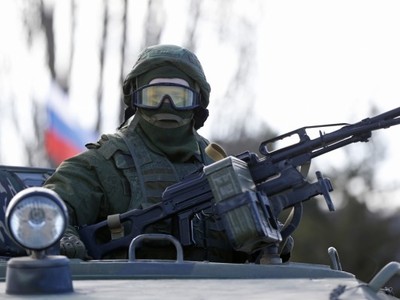The First Casualty In War? The Truth.
The Russian incursion into the Crimea region of Ukraine has left many people flummoxed. No matter where you stand on the issue, knowing the proper definition of these terms and not conflating them is important if they wish to be taken seriously on matters of foreign policy.
Secession vs. Annexation
Secession: Secession is the act of withdrawing from a political entity or union.
Annexation: Annexation is the incorporation of another territory or region into a geopolitical entity.
Russia’s government wants to avoid the word annexation and the connotations that accompany it. Russia’s strategic interests in Crimea became jeopardized when the Ukrainian parliament deposed the country’s president, Russian puppet Viktor Yanukovych.
When a larger, more powerful state militarily occupies another and then holds a sham election that is not secession; that is annexation. Actually, the proper for what happened in Crimea is irredentism.
Irredentism is any position of a state advocating annexation of territories administered by another state on the grounds of shared ethnicity or prior historical possession, either actual or alleged.
The important difference is that any annexation, irredentist or not, is instituted by a state wishing to incorporate a region or territory. Secession is a movement of the people. Consider the Maidan movement in Ukraine: it started as a small, peaceful protest consisting of mostly students. Over time it grew and the spirit of the movement began to spread. This is what grassroots change dictating by the will of the people looks like.
In Crimea masked armed thugs seized government buildings, Russian troops rolled tanks onto the streets and then the Russian government decided it was going to hold a referendum to annex Crimea under the guise of protecting the ethnic Russians in that region (from the obvious perils they would undoubtedly phase in the form of democracy and trade with the West).
Which brings us to elections.
Election Fraud vs. Voter Fraud
Election Fraud: Election fraud is basically the rigging of an election to ensure predetermined ends. Most recently Kim Jug Un held a fraudulent election where he received 100% of the vote.
Voter Fraud: Voter fraud is the misrepresentation of voters, or otherwise fraudulently injecting votes into an election. We’ve all heard the stories of dead people who remain active voters after they’ve passed.
The big difference is that election fraud is often carried out by illegitimate governments in order to justify their policies to the international community. Voter fraud is usually involved in election fraud, but cases of voter fraud occur in most elections to varying degrees. For it to truly be electoral fraud, powers to be need to organize voter fraud with a predetermined end. Individuals, party members, or campaigns that may engage in voter fraud, have no real ability to rig the entire election.
Proponents of Russia’s actions in Crimea deflect any evidence that the referendum for Crimea to join Russia was a fraud. Some have even attacked critics of the sham referendum by saying that US elections are fraudulent as well. They point to isolated cases of voter fraud or what they believe to be an unfair presidential primary process (a process set up and run by private political parties who may choose their candidates anyway they like).
This is a dangerous conflation.
Russia was militarily occupying Crimea, foreign and independent press was violently suppressed, non-Russian media shut down, no clear NO option was given to the voters, who voted on paper ballots only to be counted by Russian officials. Some districts shockingly had more votes cast than they had voters. No election observers were allowed, and a dubiously high percentage of Crimeans voted to join Russia, even though polling last month showed only about half of Crimea residents wanted to. This referendum was a sham to justify imperialistic aggression.
In the US, on the other hands, we have multiple layers of oversight from independent, government, and partisan sources. Election observers, exit polling, and avenues of recourse and redress. We have the ability to hold recounts, recall elections, or even to contest election results in court.
Sorry libertarians, Ron Paul not winning the Republican nomination is not on par with the election frauds of Kim Jung Un or Vladimir Putin.
Democratic
Libertarians tend to distrust democracy because majority rule often fails to protect the rights of minorities. It is thus surprising to hear libertarians defending Putin as a “democratically elected” leader and the actions in Crimea as being “democratic.”
Libertarians are supposed to know that even if a legitimate vote had been held, the majority of Crimeans do not have the right to force ethnic minorities of that region to join a state which will oppress them. The Tatars, and ethnic minority of Crimea, had been forced to flee their homeland under Soviet persecution, only to return to Crimea after the collapse of the Soviet Union. Russia has already moved to evict the Tatars from Crimea and those who refuse will undoubtedly face violence. The ethnic Ukrainians of the region will also face discrimination and oppression.
It’s important to note that ethnic Russians face no threat of oppression or cultural coercion from a democratic Ukraine. Ukrainians and Tatars of Crimea, however, will face oppression under Russian rule.
Even still, the use of the word “democracy” to describe Russian actions while slamming the Maidan movement as “fascist” is incorrect. The Maidan movement was an expression of popular will, which forced elected leaders to take action and cave to their demands. The resistance of the people, and the interference by Russia which led to it, is proof of Russia’s undemocratic policies towards Ukraine. Russia has always sought to control Ukrainian politics, democracy has nothing to do with it. In 2004, during Ukraine’s Orange Revolution, Putin’s regime poisoned Ukrainian opposition leader Viktor Yushchenko. Tyrants like Putin do not respect democracy, only holding elections when they need justification for their actions and when the results are a foregone conclusion.
Sanctions
There has been a lot of discussion about sanctions being an act of war. This is an untrue characterization. Sanctions can actually be used as a nonviolent response to states which engage in aggression or inhumane practices. The European Union has sanctions in place against the US that prevents its member nations from selling the US the chemical used in lethal injections. Because the EU has taken an anti-death penalty stance, they choose not to sell us that chemical. This is obviously not an act of war.
Libertarians believe in free trade for mutual benefit. Why do so many believe we should willfully trade with nations which steal the wealth of their people and use all benefit derived from such trade to further their militarism and oppression?
While an argument can certainly be made that sanction create hardliners in foreign governments by giving them an external factor to blame internal hardships on, the converse is also true: free trade with a nation ruled by autocrats will inevitably benefit that regime. Consider China’s oppression at home and trading in international markets. There the people’s labor is a resource to be endlessly exploited by the state and the profits all go to China’s militarism and to prop up failing policies domestically. Consider that the Castro regime of Cuba is forced to depend on the benevolence of Venezuela to survive. This puts them in precarious situation, whereas if sanctions were lifted, an influx of foreign goods and money would provide a lifeline for the oppressive regime.
Not all countries are the same and not all sanctions are the same. To categorically dismiss them or to mischaracterize them is to fail to understand their potential benefits. The international market community should be reserved for voluntary participation amongst parties that are mutually benefited through trade and commerce. Allowing parasitic or imperialistic states to engage in trade for the benefit of their regimes and militaristic ends is not free market capitalism any more than buying cotton off a slave owner would have been in 1860 America.
About the Author: Keith Farrell is a regular contributor to The Libertarian Republic, an Advocate for Young Voices, and founder and president of Spirits of ’76 national nonprofit organization.  He holds a BA from the University of Connecticut in American Studies and Urban & Community Studies. He has been published at PJ Media and The Daily Caller.
He holds a BA from the University of Connecticut in American Studies and Urban & Community Studies. He has been published at PJ Media and The Daily Caller.





5 comments